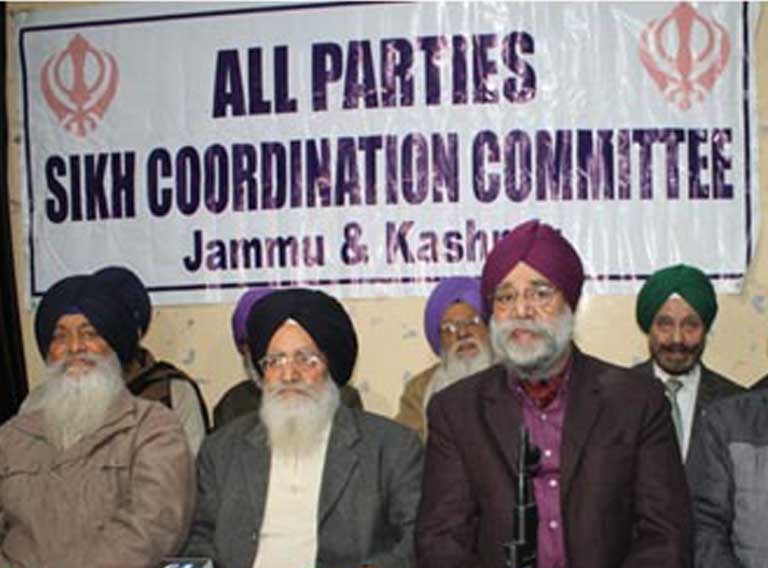Kashmir Sikhs lost in the wilderness of the Valley, ignored and bitter
![After nearly two years of snatching the full state status from J & K, today, Indian PM Narendra Modi is meeting Kashmiri leadership “without an agenda” and the Kashmir leadership wants to discuss “restoration of Article 370.” The mainstream media feeds us as talks for “delimitation for elections” as India faces pressure from international bodies and many countries. The pro-freedom Kashmir leadership is silent because virtually all of them are in prison. The pro-India Kashmir leadership is out of detention […]](https://www.theworldsikhnews.com/wp-content/uploads/2021/06/Kashmir-Sikhs-360x266.jpg)
After nearly two years of snatching the full state status from J & K, today, Indian PM Narendra Modi is meeting Kashmiri leadership “without an agenda” and the Kashmir leadership wants to discuss “restoration of Article 370.” The mainstream media feeds us as talks for “delimitation for elections” as India faces pressure from international bodies and many countries. The pro-freedom Kashmir leadership is silent because virtually all of them are in prison. The pro-India Kashmir leadership is out of detention but has decided to visit Delhi in response to the call of Prime Minister Narendra Modi “to discuss the future of Kashmir”. The Sikhs in Jammu and Kashmir are in a hopeless minority banking upon the goodness of various party leaders, who have hitherto paid lip service to Kashmiri Sikhs demands. The All-Party Sikh Coordination Committee, scholars and young Sikh activists have expressed serious concerns and wanted to associate with the talks. A WSN analysis by its editor Jagmohan Singh.
THE TOP KASHMIRI LEADERSHIP IS IN DELHI. From what has been reported so far, there has not been a murmur of protest from the Kashmir leadership who spent a good amount of the past year in detention. They readily expressed willingness to visit Delhi and meet the government of India, headed by Prime Minister Narendra Modi.
The guns are virtually silent in Kashmir. The pro-Kashmiri freedom leadership in prisons. The bayonets of Indian soldiers continue to silence the population in the Valley. The Taliban, wanting to “enter” Kashmir has reportedly been engaged by the Indian government in secret talks in Doha. Pakistan voices its concern at developments in Kashmir and raises the issue of self-determination. The Kashmiri Pandits want to assert their leadership in Jammu as well as Kashmir and also use their new political clout to turn the clock back. The international community has been asking some questions but is generally perceived to be going with the sway of India.
Communities have interests but communities that make bold decisions are able to protect, preserve and advance the interests of their constituents. The Sikhs of Kashmir are lost in the wilderness of the valley. For the last many decades, they have been vacillating between Srinagar and the valley and the Jammu region.

The demands of the Sikhs of Jammu and Kashmir, with respect to language rights and other demands, have not been met at all. In view of the talks in Delhi, the APSCC has demanded the reservation of three seats in Kashmir and four seats in the Jammu division for the Sikh community.

Writer and researcher Jasbir Singh Sarna in his latest book, The Sikhs in Jammu and Kashmir, talking about the Kashmiriyat of Sikhs says, “Kashmiri Sikhs are the aboriginals of Kashmir.”
Business Editor with The Kashmiriyat, Zainab Rauf in her recording of the woes of the Sikhs in Kashmir in her well-researched article, Despite Systematic Ignorance, Struggles amid Conflict, Undying Unity of Kashmiri Sikhs Continues to Exist, shares the pain of the Sikhs from various spheres of life in Kashmir.
Young Kashmiri Sikh activist Angad Singh has been quoted saying, “I believe it’s because we Sikhs don’t make a big vote bank; we have been ignored.”
“Our culture is intertwined by our language as Kashmiri Sikhs. It allows us to realize and practice our unique identity as Kashmiri Sikhs.”
“I believe it’s because we Sikhs don’t make a big vote bank; we have been ignored.”
Zainab Rauf explains that “Making 0.88% of the population of Kashmir, the long pending demand of a Minority Status of Kashmiri Sikhs till now has led to the failure of the formalized process of studies, research, and policies on matters specifically related to the empowerment of Kashmiri Sikhs.”
explains that “Making 0.88% of the population of Kashmir, the long pending demand of a Minority Status of Kashmiri Sikhs till now has led to the failure of the formalized process of studies, research, and policies on matters specifically related to the empowerment of Kashmiri Sikhs.”
The resilient, ever brave, and caring members of the Kashmiri Sikh community says the economics graduate from Canada has been for the last “73 years without a Minority Status, Kashmiri Sikhs have been denied their democratic right of fair participation in education institutions and job positions in Jammu Kashmir and across India, which cripples the possibility of their growth on the socio-economic ladder and the mere possibility of their existence lasting as a unique community in the long term.”
Though the J & K political parties have lent an ear to the Sikhs and other minorities, yet their demands have hitherto been ignored. The whole thrust of the delimitation exercise seems to be gerrymandering in a grandiose exercise to bring the Kashmiri Muslims into a minority in as many constituencies as possible. Furthermore, the powerful Kashmiri Pandit vote bank will now be attempting to reap as much benefit as possible from the government.
“What’s more important is that even after the colossal reason for revocation of Article 370 by the Modi government, ‘justice’ or rather ‘liberation’ of Kashmir’s minorities, the voices of Kashmiri Sikhs, like always, have been majorly sidelined.”
Though with the abrogation of Article 370, Kashmir was reduced to a union territory, yet they did not get benefits of a minority under the National Commission for Minorities Act, 1992. Their situation was the same as when J & K was a full-fledged state.

Even Zainab Rauf says, “What’s more important is that even after the colossal reason for revocation of Article 370 by the Modi government, ‘justice’ or rather ‘liberation’ of Kashmir’s minorities, the voices of Kashmiri Sikhs, like always, have been majorly sidelined.”
 With their back to the wall, the All Parties Sikh Coordination Committee (APSCC), in response to the news of Kashmir leadership going to Delhi for talks, has demanded the inclusion of minorities like Sikhs, Gujjars and Paharis in the consultations being carried out by the Delimitation Commission as part of its exercise in the union territory of Jammu & Kashmir.
With their back to the wall, the All Parties Sikh Coordination Committee (APSCC), in response to the news of Kashmir leadership going to Delhi for talks, has demanded the inclusion of minorities like Sikhs, Gujjars and Paharis in the consultations being carried out by the Delimitation Commission as part of its exercise in the union territory of Jammu & Kashmir.
Saddened by the fact that whosoever is not relevant as a vote bank, has been excluded, the Committee headed by Jagmohan Singh Raina has said that “the exclusion of minorities is unacceptable and it would be fought tooth and nail by the members of concerned communities.”
“The exclusion of minorities is unacceptable and it would be fought tooth and nail by the members of concerned communities.”
 In a statement, APSCC Chairman said that members of different minorities need to be taken on board by the Delimitation Commission before any decision about the redrawing of assembly constituencies is taken.
In a statement, APSCC Chairman said that members of different minorities need to be taken on board by the Delimitation Commission before any decision about the redrawing of assembly constituencies is taken.
Expressing his concern, while speaking to WSN, Jagmohan Singh Raina said, “any exercise without the participation of minority community members would be useless and meaningless.”
“Kashmiri Sikhs are the aboriginals of Kashmir.”
“It is imperative that members of minority communities like Sikhs, Gujjars and Paharis are consulted by the Delimitation Commission since the population is large in many assembly segments. The suggestions put forward by the political parties and minority community members should be put in the public domain before any final decision is taken by the Home Ministry.”
 Jagjeet Singh Sudan and Suchwant Singh of the Movement for Justice for Refugees of 1947 from POK, in a memorandum submitted last November, sought reservation of seats for Sikhs settled from POK in Jammu and Kashmir. WSN learns that the Delimitation Commission has turned down their request saying that till POK remains occupied, the said area and the seats shall be excluded in delimiting the territorial constituencies.
Jagjeet Singh Sudan and Suchwant Singh of the Movement for Justice for Refugees of 1947 from POK, in a memorandum submitted last November, sought reservation of seats for Sikhs settled from POK in Jammu and Kashmir. WSN learns that the Delimitation Commission has turned down their request saying that till POK remains occupied, the said area and the seats shall be excluded in delimiting the territorial constituencies.
When asked what would the APSCC do in case their demands fell on deaf ears, Jagmohan Singh Raina retorted, “if minorities are ignored, the fight goes into the streets.”
 Print
Print

 200
200


One thought on “Kashmir Sikhs lost in the wilderness of the Valley, ignored and bitter”